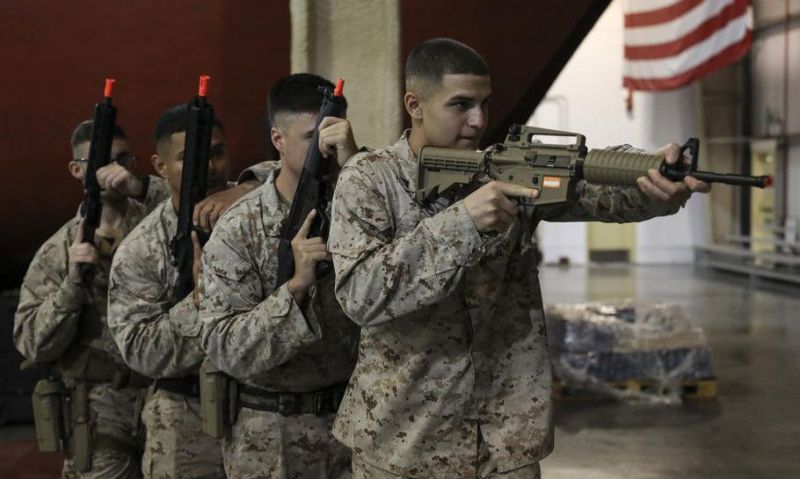
About 100 Marines have been training in Bahrain for specialized defensive teams that would travel briefly with commercial ships through and near the Strait of Hormuz.
Marines newly deployed to the Middle East already are training for shipboard roles protecting oil tankers and other commercial ships from Iranian aggression, news that comes a day after U.S. officials told some media outlets they were considering the possibility of such a plan.
About 100 Marines have been training in Bahrain for specialized defensive teams that would travel briefly with commercial ships through and near the Strait of Hormuz, said a U.S. official speaking on the condition of anonymity with Stars and Stripes because they were not authorized to speak on the matter.
Putting Marines and sailors on civilian tankers is an unprecedented step in the post-World War II era and is meant to show Iran that the U.S. will protect the right of ships to pass through the strait and adjacent waters freely, the official said.
The U.S. has developed criteria, such as a ship’s country of origin, destination, type of cargo and country of ownership, that would help determine which vessels would qualify for the security.
The teams would be “an additional layer of protection” as commercial vessels transit through sensitive areas, said the official, adding the strategy had gone well beyond the “pre-decisional stage.”
The boardings, which would be for a short duration of a ship’s voyage through the Gulf region, only would happen at the request of commercial shippers and after the U.S. had weighed qualifying criteria, the official said.
An unnamed U.S. official who spoke with The Associated Press on Thursday described the process as complex, saying boardings likely would require approval from the country under which the ship is flagged and the country under which the owner is registered.
The Marines already training in Bahrain, home of U.S. Naval Forces Central Command/U.S. 5th Fleet, arrived in advance of thousands more service members expected to come into the region over the weekend.
The Bataan Amphibious Readiness Group and the 26th Marine Expeditionary Unit, including the amphibious assault ship USS Bataan and the dock landing ship USS Carter Hall, are part of a military surge announced by the Pentagon last month to counter Iranian interference with commercial ships.
A third ship of the group, the USS Mesa Verde, will remain in the Mediterranean in the U.S. Naval Forces Europe-Africa area of responsibility.
It wasn’t clear exactly where in the Gulf region Marines and sailors would board commercial ships or where they would disembark.
Much of the oil leaving Saudi Arabia, the United Arab Emirates, Kuwait and other countries must travel through the Strait of Hormuz, a narrow chokepoint between the Persian Gulf and Gulf of Oman.
The strait, which is the only passage from the Persian Gulf to the open ocean, has seen an uptick in recent months of attempts by Iranian military forces to harass or seize oil tankers and other commercial ships.
Last month, Iranian naval forces tried to commandeer two tankers in the Gulf of Oman near the strait, firing on one of the ships.
NAVCENT/5th Fleet said it responded and prevented Iranian attempts to take the ships.
In April, Iranian forces seized a Marshall Islands-flagged oil tanker sailing to Texas.
In all, Iran has harassed, attacked or seized 20 commercial ships since 2021, the Navy has said.
The destroyers USS McFaul, USS Paul Hamilton and USS Thomas Hudner already are in the region. Hudner and McFaul are part of the Gerald R. Ford Carrier Strike Group. The aircraft carrier remains in the Mediterranean.
As part of the U.S. surge, a squadron of Air Force F-35 Lightning II fighter jets arrived in the Middle East in late July.
Those planes, from the 421st Expeditionary Fighter Squadron out of Hill Air Force Base, Utah, are expected to join an A-10 Thunderbolt “Warthog” squadron and two F-16 squadrons in patrolling the strait.
About 17 million barrels of oil travel through the strait daily, 20%-30% of the world’s total consumption, according to the Strauss Center for International Security and Law at the University of Texas at Austin.
With limited other options for transporting oil exports, such as pipelines, about 88% of all oil leaving the Persian Gulf goes through the strait, the center said.
- Security

